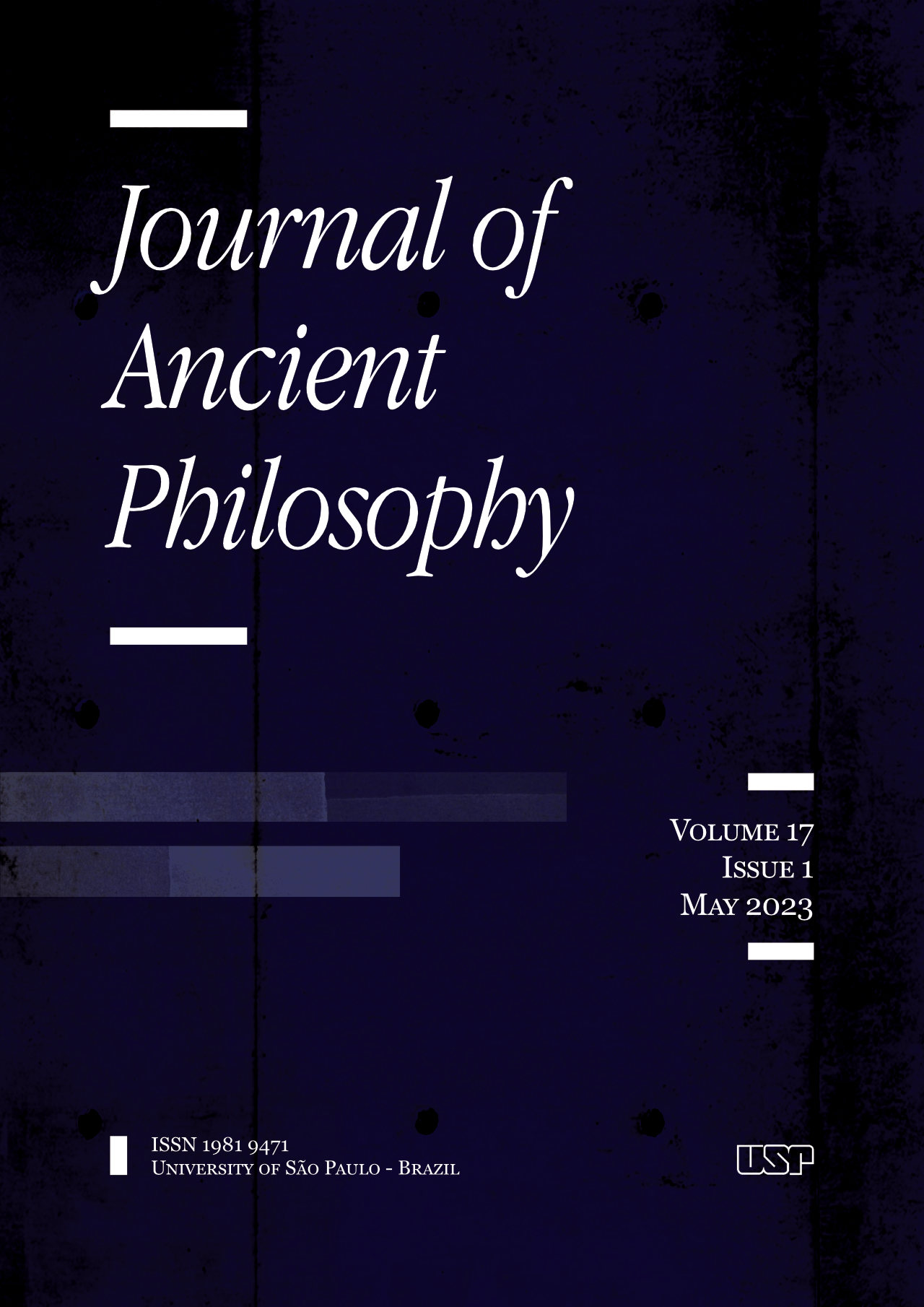Callicles as a Potential Tyrant in Plato's Gorgias
DOI:
https://doi.org/10.11606/issn.1981-9471.v17i1p01-35Palavras-chave:
Plato, Moral Psychology, Tyranny, CalliclesResumo
This essay argues that Callicles is depicted by Plato in the Gorgias as a potential tyrant from a psychological standpoint. To this end I will contend that the Calliclean moral psychology sketched at 491e-492c points towards the analysis of the tyrannical individual pursued by Plato in books VIII and IX of the Republic based upon the tripartite theory of the soul. I will thereby attempt to show that (i) in the Gorgias, Callicles does not actually personify the ideal of the superior person advocated by himself insofar as he is still susceptible to shame, as evinced by Socrates' cross-examination (494c-495a); and that (ii) looking forward to the Republic, he can be understood for this same reason as being precisely on the threshold between the democratic and the tyrannical soul.
Downloads
Referências
Arruzza, C. (2019). A Wolf in the City: Tyranny and the Tyrant in Plato's Republic. Oxford: Oxford University Press.
Asheri, D.; Lloyd, A. & Corcella, A. (2007). A Commentary on Herodotus Books I-IV. Oxford University Press.
Brickhouse, T. C. & Smith, N. D. (2010). Socratic Moral Psychology. Cambridge: Cambridge University Press.
Büttner, S. (2006). “The Tripartition of the Soul in Plato's Republic”. In New Essays on Plato. Ed. F. G. Hermann. Ceredigion: Classical Press of Wales, 75-94.
Carone, G. R. (2004). Calculating Machines or Leaky Jars? The Moral Psychology of Plato's Gorgias. Oxford Studies in Ancient Philosophy 26, 55-96.
Cooper, J. (1999a). “Socrates and Plato in Plato’s Gorgias”. In Reason and Emotion. Ed. J. Cooper. Princeton: Princeton University Press, 29-74.
Cooper, J. (1999b). “Plato's Theory of Human Motivation”. In Reason and Emotion. Ed. J. Cooper. Princeton: Princeton University Press, 118-137.
Dodds, E. R. (1959). Plato. Gorgias. Oxford: Oxford University Press.
Ferrari, G. R. F. (2007). “The Three-Part Soul”. In The Cambridge Companion to Plato’s Republic. Ed. G. R. F. Ferrari. Cambridge: Cambridge University Press, 165-201.
Giorgini, G. 2005. “Il Tiranno”. In Platone. La Repubblica. Libri VIII-IX. Ed. M. Vegetti. Napoli: Bibliopolis, 423-470.
Griffith, T. (2010). Plato. Gorgias, Menexenus, Protagoras. Ed. M. Schofield. Cambridge: Cambridge University Press.
Grube, G.M.A & Reeve, C.D.C. (1997). Plato. Complete Works. Ed. J. Cooper. Indianapolis: Hackett Publishing Companay.
Hitz, Z. (2010). “Degenerate regimes in Plato's Republic”. In Plato's Republic: A Critical Guide. Ed. M. L. McPherran. Cambridge: Cambridge University Press, 103-131.
Hornblower, S. (1991). A Commentary on Thucydides, Vol. 1: Books I-III. Oxford: Oxford University Press.
Irwin, T. (1979). Plato. Gorgias. Oxford: Oxford University Press.
Irwin, T. (1995). Plato’s Ethics. Oxford: Oxford University Press.
Johnstone, M. A. (2011). Changing Rulers in the Soul: Psychological Transitions in Republic 8-9. Oxford Studies in Ancient Philosophy 41, 139-167.
Kahn, C. (1983). Drama and Dialectic in Plato’s Gorgias. Oxford Studies in Ancient Philosophy 1, 75-121.
Kahn, C. (1996). Plato and the Socratic Dialogue. Cambridge: Cambridge University Press.
Lopes, D. R. N. (2017). Moral Psychology in Plato's Gorgias. Journal of Ancient Philosophy, v. 11, 1-39.
Lorenz, H. (2006a). “The Analysis of the Soul in Plato's Republic”. In Blackwell Guide to Plato's Republic. Ed. G. Santas. Oxford: Oxford University Press, 146-165.
Lorenz, H. (2006b). The Brute Within. Oxford: Oxford University Press.
Ludwig. P. W. (2007). “Eros in the Republic”. In The Cambridge Companion to Plato’s Republic. Ed. G. R. F. Ferrari. Cambridge: Cambridge University Press, 202-231.
McKim, R. (1988). “Shame and Truth in Plato’s Gorgias”. In Platonic Writings – Platonic Readings. Ed. C. L. Griswold. New York: Penn State University Press, 34-48.
Moss, J. (2005). Shame, Pleasure and the Divided Soul. Oxford Studies in Ancient Philosophy 29, 137-170.
Parry, R. (2007). “The Unhappy Tyrant and the Craft of Inner Rule”. In The Cambridge Companion to Plato’s Republic. Ed. G. R. F. Ferrari. Cambridge: Cambridge University Press, 386-414.
Penner, T. (1992). “Socrates and the early dialogues”. In The Cambridge Companion to Plato. Ed. R. Kraut. Cambridge: Cambridge University Press, 121-169.
Renault, O. (2014). Platon. La Médiation de les Émotions. Paris: Libraire Philosophique J. Vrin.
Shaw, J. C. (2015). Plato's Anti-hedonism and the Protagoras. Cambridge: Cambridge University Press.
Solinas, M. (2005). “Desideri: Fenomenologia Degenerativa e Strategie di Controllo”. In Platone. La Repubblica. Libri VIII-IX. Ed. M. Vegetti. Napoli: Bibliopolis, 471-498.
Stalley, R. F. (2007). The Tripartite Soul in the Republic. Oxford Studies in Ancient Philosophy 32, 63-89.
Tarnopolsky, C. H. (2010). Prudes, Perverts and Tyrants. Plato's Gorgias and the Politics of Shame. Princeton: Princeton University Press.
Woolf, R. (2000). Callicles and Socrates: Psychic (Dis)harmony in the Gorgias. Oxford Studies in Ancient Philosophy 18, 1-40.
Downloads
Publicado
Edição
Seção
Licença
Direitos autorais (c) 2023 Daniel R. N. Lopes

Este trabalho está licenciado sob uma licença Creative Commons Attribution-NonCommercial 4.0 International License.
Autores que publicam nesta revista concordam com os seguintes termos:- Autores mantém os direitos autorais e concedem à revista o direito de primeira publicação, com o trabalho simultaneamente licenciado sob a Licença Creative Commons Attribution (CC 4.0) que permite o compartilhamento do trabalho com reconhecimento da autoria e publicação inicial nesta revista.
- Autores têm autorização para assumir contratos adicionais separadamente, para distribuição não-exclusiva da versão do trabalho publicada nesta revista (ex.: publicar em repositório institucional ou como capítulo de livro), com reconhecimento de autoria e publicação inicial nesta revista.
- Autores têm permissão e são estimulados a publicar e distribuir seu trabalho online (ex.: em repositórios institucionais ou na sua página pessoal) a qualquer ponto antes ou durante o processo editorial, já que isso pode gerar alterações produtivas, bem como aumentar o impacto e a citação do trabalho publicado (Veja O Efeito do Acesso Livre).


